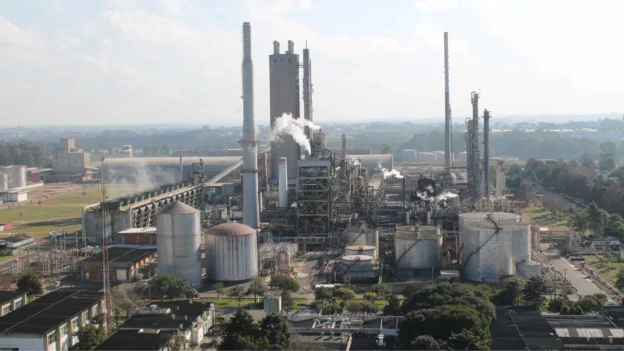The Brazilian state-owned Petrobras has taken a new step in the resumption of its industrial activity with the delivery of the first batch of ARLA 32 produced at the Araucária Nitrogenados (Ansa) plant, located in Paraná.
This is the first product output since the unit’s closure in 2020, marking the operational reactivation of a key plant for the self-sufficiency strategy in fertilizers and derivatives.
ARLA 32 is produced at Ansa under a contract manufacturing agreement signed with Yara, a leading multinational company in nitrogen fertilizers. Yara collaborates by supplying the low-biuret urea used in the formulation, in addition to being in charge of marketing the final product.
Test activities began in June 2025 and the first shipments to the states of Paraná and Santa Catarina are now underway.
What is ARLA 32 and why is it so important?
ARLA 32 is an aqueous solution composed of urea and demineralized water that works in SCR systems of diesel vehicles. diesel vehiclesIt transforms nitrogen oxides (NOx) into nitrogen and water vapor, thus helping to reduce polluting emissions.
Its local production allows supplying domestic demand with greater stability and consolidating the environmental commitment of the energy sector. energy sector’s environmental commitment..
The reactivation of Ansa is part of a R$6 billion investment package that Petrobras will allocate to the fertilizer segment over the next five years. In this Paraná unit alone, an injection of R$870 million is projected.
Ansa has installed capacity to produce up to 720 thousand tons of urea per year, in addition to 475 thousand tons of ammonia and 450 thousand m3 of ARLA 32. The plant is expected to be operating at full capacity in the second half of 2025.
Towards autonomy in industrial inputs
With Ansa’s start-up, together with the operations planned at other plants, such as Fafens and UFN-3, Petrobras plans to cover up to 35% of the domestic demand for urea and derivatives. This strategy seeks to reduce foreign dependence, to boost the gas market and strengthen the security of supply of essential inputs for Brazilian industry.
ARLA 32 production is expected to reach a monthly volume of 3 million liters. This figure reflects the growth of the diesel fleet and stricter regulatory requirements in terms of emissions.
Source and photo: Petrobras

